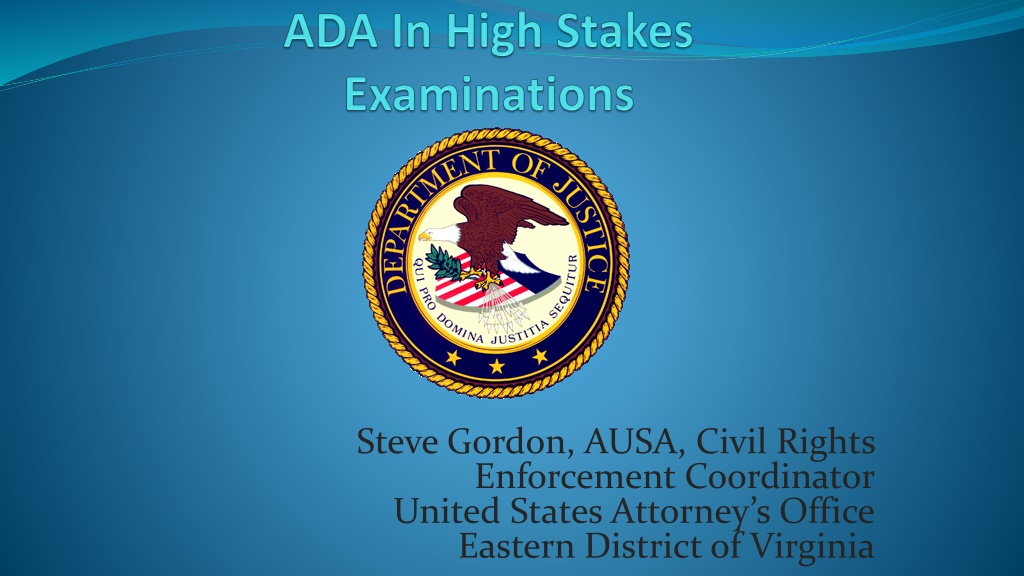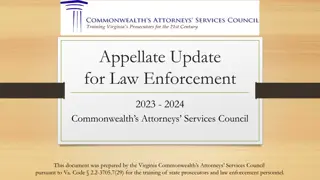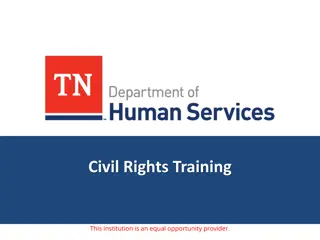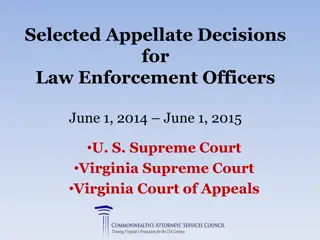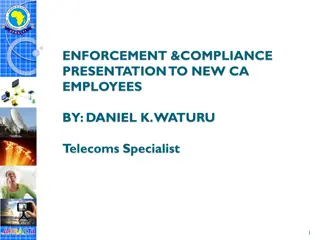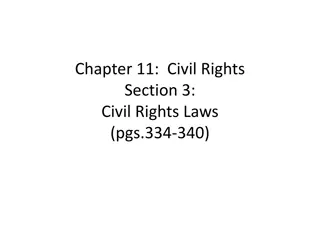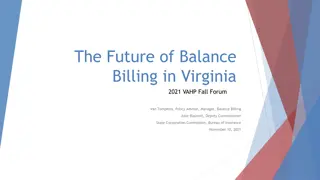Insights from Steve Gordon, Civil Rights Enforcement Coordinator, Eastern District of Virginia
Steve Gordon, AUSA and Civil Rights Enforcement Coordinator in the US Attorney’s Office for the Eastern District of Virginia, shares opinions and perspectives in this statement. The views expressed are his own and may not represent those of the US Department of Justice.
Download Presentation

Please find below an Image/Link to download the presentation.
The content on the website is provided AS IS for your information and personal use only. It may not be sold, licensed, or shared on other websites without obtaining consent from the author. Download presentation by click this link. If you encounter any issues during the download, it is possible that the publisher has removed the file from their server.
E N D
Presentation Transcript
Steve Gordon, AUSA, Civil Rights Enforcement Coordinator United States Attorney s Office Eastern District of Virginia
Opinions Expressed Herein or Otherwise are those of the Speaker and do not Necessarily Reflect the Views of the United States Department of Justice.
Summary of key concepts in the ADA testing accommodation area. ADA provisions and regulations that expressly address or touch upon testing accommodations. ADAAA s expansive definition of disability and why that is important for testing accommodations. Examples of high stakes exams covered by the ADA. Test taking implicates major life activities. Helpful technical assistance
High stakes examination results should accurately reflect the aptitude of the candidate not their disability. Testing entities should give considerable weight to documentation of past accommodations given in similar testing situations. Psychometric evaluations cannot capture all disabilities. Some disabilities require a qualified professional making a clinical judgment. Entities that receive documentation by a qualified professional who made an individualized assessment of an applicant should generally accept the documentation and provide the accommodation
Reports from experts with personal familiarity with the candidate should take precedence over those from reviewers from testing agencies who have never personally met the candidate. Congress intended for the definition of disability to be construed broadly. Individuals with disabilities, who need accommodations, should have the same access to examination location and times.
Section 309 of the ADA. 42 U.S.C. 12189 The ADA s Section 309 regulations. 28 C.F.R. 36.309 The section-by-section analysis for 28 C.F.R. 36.309 includes very helpful language. DOJ Technical Assistance Publication entitled: ADA Requirements: Testing Accommodations (DOJ Publication).
The ADAs broad definition of disability, including the congressional findings that lead to Congress to pass the ADAAA and the rules of construction. 42 U.S.C. 12101-02. The ADA regulation s discussion of the definition of disability. 28 C.F.R. 35.108 & 36.105. The section-by-section analysis of the regulation s definition of disability. The requirement that covered entities provide appropriate auxiliary aids and services for individuals with communication disabilities. 28 C.F.R. 35.160 & 36.303.
[C]ensus data, national polls, and other studies have documented that people with disabilities, as a group, occupy an inferior status in our society, and are severely disadvantaged socially, vocationally, economically, and educationally; [T]he Nation's proper goals regarding individuals with disabilities are to assure equality of opportunity, full participation, independent living, and economic self-sufficiency for such individuals; 42 U.S.C. 12101(a)(6)-(7)
Then-Judge Sotomayor stated, [I]n the modern era, where test-taking begins in the first grade, and standardized tests are a regular and often life-altering occurrence thereafter, both in school and at work, I find test-taking is within the ambit of major life activity. Bartlett v. N.Y. State Bd. of Law Exam'rs, 970 F. Supp. 1094, 1117 (S.D.N.Y. 1997), aff'd in part and vacated in part, 156 F.3d 321 (2d Cir. 1998),cert. granted, judgment vacated on other grounds, 527 U.S. 1031 (1999), and aff'd in part, vacated in part, 226 F.3d 69 (2d Cir. 2000).
Exams administered by any private, state, or local government entity related to applications, licensing, certification, or credentialing for secondary or postsecondary education, professional, or trade purposes are covered by the ADA and testing accommodations, pursuant to the ADA, must be provided. ADA Requirements: Testing Accommodations (DOJ Publication).
High school equivalency exams and entrance exams. While some institutions of high learning that offer bachelor degrees are no longer requiring candidates to take SAT or ACT, many still do. Graduate schools usually require examinations LSAT, MCAT, GMAT & GRE. In order to be licensed or certified in some professions, candidates need to take an examination. Examinations for such licenses or certifications are covered by the ADA. Some examples: bar examination, medical professions (including specialties), mental health professionals, accountants, certified financial planner, building trades, and teaching certification.
Learning disabilities, such as dyslexia. ADHD. Vision disabilities. Disabilities related to hearing. Post-traumatic stress disorder. Physical disabilities, including tremors. Diabetes. Learning disabilities, such as dyslexia.
For the majority of the population, the basic mechanics of reading and writing do not pose extraordinary lifelong challenges; rather, recognizing and forming letters and words are effortless, unconscious, automatic processes. Because specific learning disabilities are neurologically- based impairments, the process of reading for an individual with a reading disability (e.g., dyslexia) is word-by-word, and otherwise cumbersome, painful, deliberate and slow throughout life. H.R. Rep. No. 110 730 pt. 1, at 10 11 (2008).
Any person that offers examinations or courses related to applications, licensing, certification, or credentialing for secondary or postsecondary education, professional, or trade purposes shall offer such examinations or courses in a place and manner accessible to persons with disabilities or offer alternative accessible arrangements for such individuals. 42 U.S.C. 12189
The legislative history of the relevant provision of the ADA (sometimes referred to as section 309) explains that this provision was adopted in order to assure that persons with disabilities are not foreclosed from educational, professional or trade opportunities because an examination or course is conducted in an inaccessible site or without an accommodation Rep. No. 101-485 (III), at 68-69 (1990). professional or trade opportunities or without an accommodation. H.R.
Any private entity offering an examination covered by this section must assure that (i) The examination is selected and administered so as to best ensure that, when the examination is administered to an individual with a disability that impairs sensory, manual, or speaking skills, the examination results accurately reflect the individual s aptitude or achievement level or whatever other factor the examination purports to measure, rather than reflecting the individual s impaired sensory, manual, or speaking skills (except where those skills are the factors that the examination purports to measure); 28 C.F.R. 36.309(b)(1)(i).
DOJ filed a letter brief in Rawdin v. American Bd. Of Pediatrics, that explained a disability that impairs a sensory skill can impair an individual s physical, neurological or cognitive processing individual sees, hears, touches, tastes, and smells. An individual s sense of sight includes not only the physical ability to see, but also the neurological and cognitive processing to identify the image, store the image in memory, associate the image with one s knowledge, and recall the image. processing of what an
The Best ensure standard is not the same as the reasonable accommodation standard. Reasonable accommodation does not appear in the title III statutory or regulatory provisions relating to testing accommodations. Indeed, the phrase reasonable accommodation is used only in title I the statute s employment provisions. See 42 U.S.C. 12111(9), 12112(b)(5). www.justice.gov/crt/about/app/briefs/rawdinbrief.pdf www.justice.gov/crt/about/app/briefs/rawdinbrief.pdf
Required modifications to an examination may include changes in the length of time permitted for completion of the examination and adaptation of the manner in which the examination is given. 28 C.F.R. 36.309(b)(2).
A private entity offering an examination covered by this section shall provide appropriate auxiliary aids for persons with impaired sensory, manual, or speaking skills, unless that private entity can demonstrate that offering a particular auxiliary aid would fundamentally alter the measurement of the skills or knowledge the examination is intended to test or would result in an undue burden. Auxiliary aids and services required by this section may include taped examinations, interpreters or other effective methods of making orally delivered materials available to individuals with hearing impairments, Brailled or large print examinations and answer sheets or qualified readers for individuals with visual impairments or learning disabilities, transcribers for individuals with manual impairments, and other similar services and actions. 28 C.F.R. 36.309(b)(3).
An examination that is designed for individuals with impaired sensory, manual, or speaking skills is offered at equally convenient locations, as often, and in as timely a manner as are other examinations. 28 C.F.R. 36.309(b)(1)(ii).
The examination is administered in facilities that are accessible to individuals with disabilities or alternative accessible arrangements are made. 28 C.F.R. 36.309(b)(1)(ii).
Professional Publications, Inc. Company that offered a course for the professional engineering degree and several individuals who are deaf requested that the company to caption the course. PPI refused to caption the course. Settlement required captioning, payment of compensatory damages ($40,000) and a penalty ($10,000).
Any request for documentation, if such documentation is required, is reasonable and limited to the need for the modification, accommodation, or auxiliary aid or service requested. 28 C.F.R. 36.309(b)(1)(iv).
Any private entity offering an examination covered by this section must assure modifications, accommodations, or auxiliary aids or services, the entity gives considerable weight to documentation of past modifications, accommodations received in similar testing situations, as well as such modifications, accommodations, or related aids and services provided in response to an Individualized Education Program (IEP) provided under the Individuals with Disabilities Education Act or a plan describing services provided pursuant to section 504 of the Rehabilitation Act of 1973, as amended (often referred as a Section 504 Plan). 28 C.F.R. 36.309(b)(1)(v). must assure that . . . When considering requests for the entity gives considerable weight to documentation of past modifications, accommodations, or auxiliary aids or services
The Departments history of enforcement in this area has demonstrated that a recent history of past accommodations is critical to an understanding of the applicant's disability and the appropriateness of testing accommodations. 28 C.F.R. 36, part A.
The new regulatory language clarifies that an applicant's past use of a particular modification, accommodation, or auxiliary aid or service in a similar testing setting or pursuant to an IEP or Section 504 Plan provides critical information in determining those examination modifications that would be applicable in a given circumstance. The addition of this language and the appropriate weight to be accorded it is seen as important by the Department because the types of accommodations provided in both these circumstances are typically granted in the context of individual consideration of a student's needs by a team of qualified and experienced professionals. Even though these accommodations decisions form a common sense and logical basis for testing entities to rely upon, they are often discounted and ignored by testing entities The addition of this language and the appropriate weight to be accorded it is seen as important by the Department because the types of accommodations provided in both these circumstances are typically granted in the context of individual consideration of a student's needs by a team of qualified and experienced professionals. Even though these accommodations decisions form a common sense and logical basis for testing entities to rely upon, they are often discounted and ignored by testing entities. Section-by-section analysis of regulations.
Example. Where a student with a Section 504 Plan in place since middle school that includes the testing accommodations of extended time and a quiet room is seeking those same testing accommodations for a high stakes test, and certifies that he or she still needs those testing accommodations, the testing entity receiving such documentation should generally grant the request ADA Requirements: Testing Accommodations (DOJ Publication). extended time and a quiet room is seeking those same testing accommodations for a high- - stakes test, and certifies that he or she still needs those testing accommodations, the testing entity receiving such documentation should generally grant the request.
The District Court in Ramsay found that NBME ran afoul of 28 C.F.R. 36.309(b)(v requests for ... accommodations ... the [testing] entity give[ ]considerable weight to documentation of past modifications, accommodations, or auxiliary aids or services received in similar testing situations ... Again, it does not appear from the record that NBME gave any consideration, much less the considerable weight required to Ms. Ramsay's past record of having received accommodations v. National Board of Medical Examiners, 2019 WL 7372508 at *18 (E.D.Pa. 2019) (emphasis added). ran afoul of 28 C.F.R. 36.309(b)(v) which requires that [w]hen considering Again, it does not appear from the record that NBME gave any consideration, much less the considerable weight required to Ms. Ramsay's past record of having received accommodations. Ramsay
The District Court expressly rejected NBMEs outside consultants re-analyzing the results of numerous diagnostic tests that were administered to the test taker, the NBME did exactly what the ADAAA and the implementing regulations expressly directed covered entities, including testing entities, not to do: focus on the question of whether the individual meets the definition of disability. Ramsay v. National Board of Medical Examiners, 2019 WL 7372508 (E.D.Pa. 2019).
Justice Sotomayor wrote (as an appellate court judge sitting by designation in the district court): learning disabilities cannot captured by psychometric measures alone and . . . clinical observations are essential to a diagnosis of learning disabilities New York Bd. Of Law Examiners, 2001 WL 930792 (S.D.N.Y. 2001) (emphasis added). cannot be clinical observations are essential to a diagnosis of learning disabilities. Bartlett v.
A learning disability is not measurable in the same way a blood disease can be measured in a serum test. By its very nature, diagnosing a learning disability requires clinical judgment . . . . [A]s much as the Board would like to find an easy test discriminator for a reading disability in its applicants, such a test does not exist. . . . I also do not accept the position of defendants experts that clinical judgments of a lack of automaticity must be rejected as subjective York Bd. Of Law Examiners, 970 F.Supp. 1094, 1114 (S.D.N.Y. 1997) (emphasis added). I also do not accept the position of defendants experts that clinical judgments of a lack of automaticity must be rejected as subjective. Bartlett v. New
Justice Sotomayor also wrote that [R]eliance on clinical judgments is necessary to diagnose learning disabilities (as it is with other types of disabilities, such as mental illness). Bartlett v. New York Bd. Of Law Examiners, 2001 WL 930792 (S.D.N.Y. 2001).
In addition, the Department does not agree with the assertions made by testing and educational entities that evidence of testing and grades is objective and, therefore, should be weighted more heavily, while evidence of self-mitigating measures, informal accommodations, or recently provided accommodations or modifications is inherently subjective and should be afforded less consideration. Congress's discussion of the relevance of testing outcomes and grades clearly indicates that it did not consider them definitive evidence of the existence or non-existence of a disability. Amendment of Americans With Disabilities Act Title II and Title III Regulations To Implement ADA Amendments Act of 2008, 81 FR 53204- 01, 2016 WL 4210327, at *53237 (August 11, 2016).
While tests and grades typically are numerical measures of performance, the capacity to quantify them does not make them inherently more valuable with respect to proving or disproving disability. To the contrary, Congress's incorporation of rules of construction emphasizing broad coverage of disabilities to the maximum extent permitted, its direction that such determinations should neither contemplate ameliorative mitigating measures nor demand extensive analysis, and its recognition of learned and adaptive modifications all support its openness for individuals with impairments to put forward a wide range of evidence to demonstrate their disabilities. Amendment of Americans With Disabilities Act Title II and Title III Regulations To Implement ADA Amendments Act of 2008, 81 FR 53204-01, 2016 WL 4210327, at *53237 (August 11, 2016).
Additionally, while testing applicants should present documentation from qualified professionals with expertise in the pertinent field, it also is critical that testing entities that review documentation submitted by prospective examinees in support of requests for testing modifications or accommodations ensure that their own reviews are conducted by qualified professionals with similarly relevant expertise it also is critical that testing entities that review documentation submitted by prospective examinees in support of requests for testing modifications or accommodations ensure that their own reviews are conducted by qualified professionals with similarly relevant expertise. Section-by-Section analysis.
